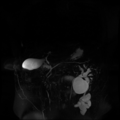磁共振胰胆管成像 (magnetic resonance cholangiopancreatography ,MRCP)是利用“磁共振 水成像”的非介入性胰胆管呈现技术;其可对肝内胆管、胆总管、胆囊和胰管的静态液体进行胰胆管成像[ 1]
静止或流动缓慢的自由水表现为高信号,而周围器官组织呈低信号;因而不需要使用对比剂 就能获得类似于内镜逆行胰胆管造影 的图像。
MRCP属于一种医学成像 技术,它使用磁共振成像 以无创方式可视化胆管 和胰管 。该技术可用于确定胆结石 是否卡在胆囊 周围的任何导管中[ 2]
MRCP已逐渐取代内镜逆行胰胆管造影 (ERCP)作为首选检查。MRCP在诊断胆道系统 、胰管和进入周围实体器官方面非常准确。与ERCP相比,MRCP的优点是其无创性、成本更低、检查时间更短、所需的工作人员更少,并且没有电离辐射。[ 3] [ 4] [ 5] [ 6]
MRCP用于诊断胆结石。它还能非常可靠地诊断胆总管囊肿 。[ 7] 胰腺癌 的切除术和寻找原发性硬化性胆管炎 的并发症,如肝硬化 和胆管癌 。[ 7]
受试者需要禁食至少四个小时,以确保胆管系统最大程度地被液体扩张,同时将胃肠系统中的液体保持在最低限度。[ 2] [ 2] 阿萨伊 汁和水可用于降低T2信号强度,[ 2] [ 8]
MRCP使用重T2加权MRI脉冲序列 。[ 5] [ 9] 促胰液素 也被给予患者以增加导管顺应性,使成像更容易。[ 5]
MRCP于1991年由德国医生沃尔纳首次应用于临床。[ 10]
良性胆道狭窄。MRCP生成的3D文件
MRCP数据中良性胆道狭窄的3D打印模型。
正常MRCP(可见肾囊肿)
^ Radiology (ACR), Radiological Society of North America (RSNA) and American College of. MRCP (MR Cholangiopancreatography) . Radiologyinfo.org. Radiological Society of North America. [2022-07-04 ] . (原始内容 存档于2022-07-05) (英语) . ^ 2.0 2.1 2.2 2.3 admin. Magnetic Resonance Cholangiopancreatography (MRCP) . Anavara. [2022-07-04 ] . (原始内容 存档于2022-07-05) (加拿大英语) . ^ Mandarano, G.; Sim, J. The diagnostic MRCP examination: overcoming technical challenges to ensure clinical success . Biomedical Imaging and Intervention Journal. 2008-10, 4 (4) [2022-07-04 ] . ISSN 1823-5530 PMC 3097748 PMID 21611015 doi:10.2349/biij.4.4.e28 原始内容 存档于2022-07-05). ^ Prasad, S. R.; Sahani, D.; Saini, S. Clinical applications of magnetic resonance cholangiopancreatography . Journal of Clinical Gastroenterology. 2001-11, 33 (5) [2022-07-04 ] . ISSN 0192-0790 PMID 11606850 doi:10.1097/00004836-200111000-00004 原始内容 存档于2022-07-05). ^ 5.0 5.1 5.2 Stevens, Tyler; Freeman, Martin L. 57 - Recurrent Acute Pancreatitis. Chandrasekhara, Vinay (编). Clinical Gastrointestinal Endoscopy (Third Edition) . Philadelphia: Elsevier. 2019-01-01: 661–673.e3 [2022-07-04 ] . ISBN 978-0-323-41509-5原始内容 存档于2022-07-06) (英语) . ^ Hekimoglu, Koray; Ustundag, Yucel; Dusak, Abdurrahim; Erdem, Zuhal; Karademir, Bulent; Aydemir, Selim; Gundogdu, Sadi. MRCP vs. ERCP in the evaluation of biliary pathologies: review of current literature . Journal of Digestive Diseases. 2008-08, 9 (3) [2022-07-04 ] . ISSN 1751-2972 PMID 18956595 doi:10.1111/j.1751-2980.2008.00339.x 原始内容 存档于2022-07-05). ^ 7.0 7.1 Fulcher, Ann S.; Turner, Mary Ann. chapter 77 - Magnetic Resonance Cholangiopancreatography. Gore, Richard M. (编). Textbook of Gastrointestinal Radiology (Third Edition) . Philadelphia: W.B. Saunders. 2008-01-01: 1383–1398 [2022-07-04 ] . ISBN 978-1-4160-2332-6原始内容 存档于2022-07-06) (英语) . ^ Al-atia, Mohassad. Can oral contrast enhance image quality at MRCP? A literature review . 2016. ^ Griffin, Nyree; Charles-Edwards, Geoff; Grant, Lee Alexander. Magnetic resonance cholangiopancreatography: the ABC of MRCP . Insights into Imaging. 2012-02, 3 (1) [2022-07-04 ] . ISSN 1869-4101 PMC 3292642 PMID 22695995 doi:10.1007/s13244-011-0129-9 原始内容 存档于2022-07-05). ^ Caramella, Davide; Vagli, Paola; Bartolozzi, Carlo. Biliary Anatomy. Baert, Albert L. (编). Encyclopedia of Diagnostic Imaging . Berlin, Heidelberg: Springer. 2008: 121–125. ISBN 978-3-540-35280-8doi:10.1007/978-3-540-35280-8_234 (英语) .



